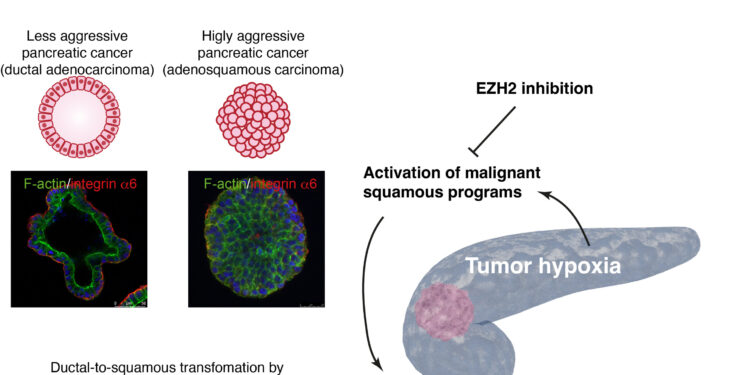A study using organoids derived from pancreatic cancer tissues from patients has revealed that a subset of highly aggressive forms of pancreatic cancer, called adenosquamous carcinoma, develops from less aggressive ductal adenocarcinoma through identity switching. Tumor hypoxia mediates this identity switch from ductal to squamous cells through epigenetic control, which could be used as a therapeutic target to treat aggressive pancreatic cancers. Credit: Toshiro Sato of Keio University
Unlike other commonly diagnosed cancers such as colorectal cancer and lung cancer, the five-year survival rate after diagnosis of pancreatic cancer is alarmingly low: 8.5% in Japan.
“Only the lucky few who are diagnosed early and undergo surgery survive pancreatic cancer. While research into colorectal and lung cancers has extended life expectancy by several years, pancreatic cancer treatment is still at a stage where a combination of the latest therapies gives patients only a few extra weeks,” says Professor Toshiro Sato of Keio University School of Medicine.
Changes in the identity of pancreatic cancer cells may contribute to their aggressiveness. About 10% of pancreatic cancers involve PASC, a condition that arises from ductal cells that begin to resemble squamous cells, a type of epithelial cell found in the esophagus and trachea. This change in identity allows the cancer cells to thrive in an environment where they otherwise could not thrive.
Surviving without oxygen
To test whether the same phenomenon applied to humans, Sato’s team tried to make PASC from scratch using normal pancreas organoids and genetic engineering technology. The results are published in the journal Natural Cell Biology.
Silencing KDM6A, a histone modification gene involved in epigenetic regulation of gene expression, and GATA6, a gene involved in pancreatic development, allowed less aggressive pancreatic cancer cells to transform into PASC-like cells.
However, a previous study found that not all PASC-like cells had KDM6A mutations. Building on a recent study showing that oxygen is essential for KDM6A to function, the team exposed pancreatic cancer organoids to low-oxygen conditions. After two months, the organoids began to resemble PASC, suggesting that low-oxygen environments play an important role in the transformation.
The role of low oxygen in altering cell identity partly explains the high mortality rate of pancreatic cancer. Many cancer tissues have extra blood vessels that provide oxygen and nutrients, fueling cell growth, whereas blood vessels are known to be very rare in pancreatic cancers.
“Why pancreatic cancers became so aggressive without the extra oxygen and nutrients was unclear, but the current study elucidates the genetic mechanisms behind how they transform under low oxygen supply,” Sato says.
Targeting the epigenome
The study also showed that a class of drugs called EZH2 inhibitors, which block the addition of epigenetic markers to the genome, can reverse the molecular changes that trigger transformation into PASC-like cells. “The results of this study suggest that drugs targeting these processes could be very effective against other cancers that become aggressive due to identity changes,” Sato says.
An important next step, Sato said, would be to collaborate with applied research teams to validate the effectiveness of combining EZH2 inhibitors with other drugs. In addition, Sato’s research is now focusing on studying the early stages of pancreatic cancer development.
“In pancreatic cells that become cancerous, what happens before mutations occur? This knowledge could help with prevention,” Sato says.
More information:
Hiroki Tamagawa et al, Wnt-deficient and hypoxic environment orchestrates squamous reprogramming of human pancreatic ductal adenocarcinoma, Natural Cell Biology (2024). DOI: 10.1038/s41556-024-01498-5
Provided by Keio University
Quote:Pancreatic cancers change identity as they transform into aggressive types, organoid study finds (2024, September 5) retrieved September 5, 2024 from
This document is subject to copyright. Apart from any fair dealing for the purpose of private study or research, no part may be reproduced without written permission. The content is provided for informational purposes only.



